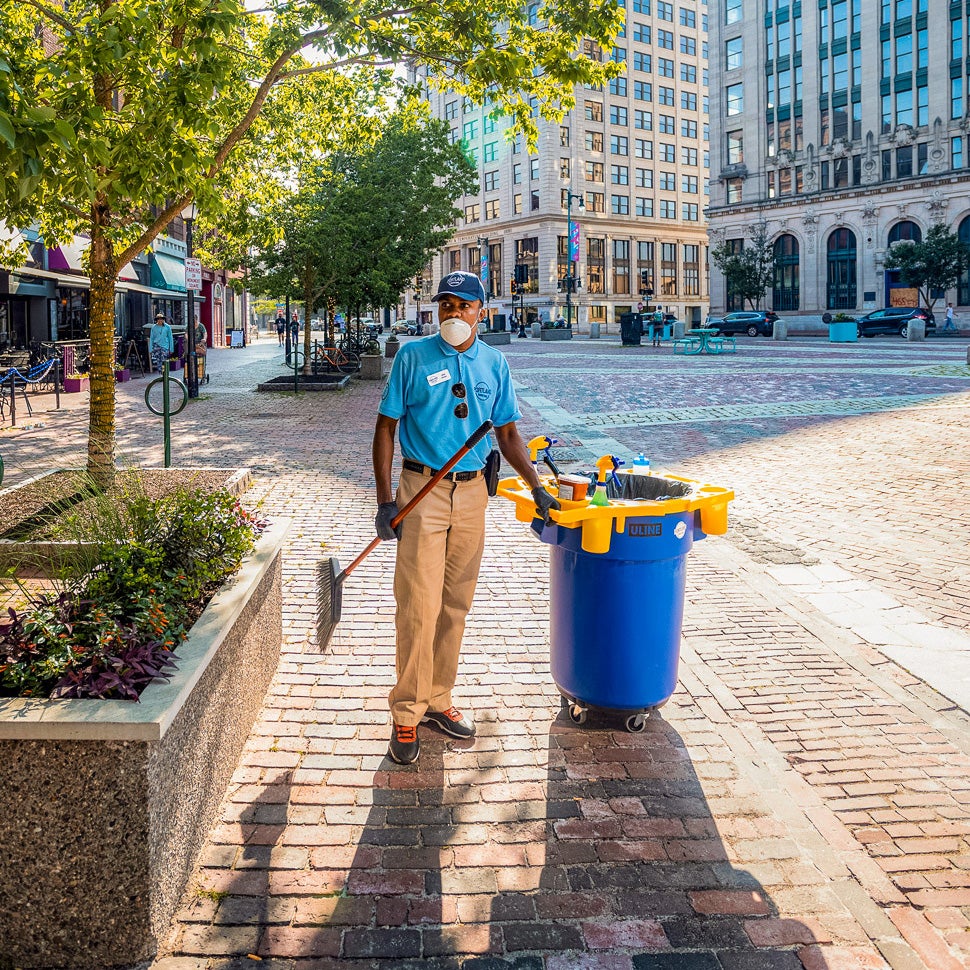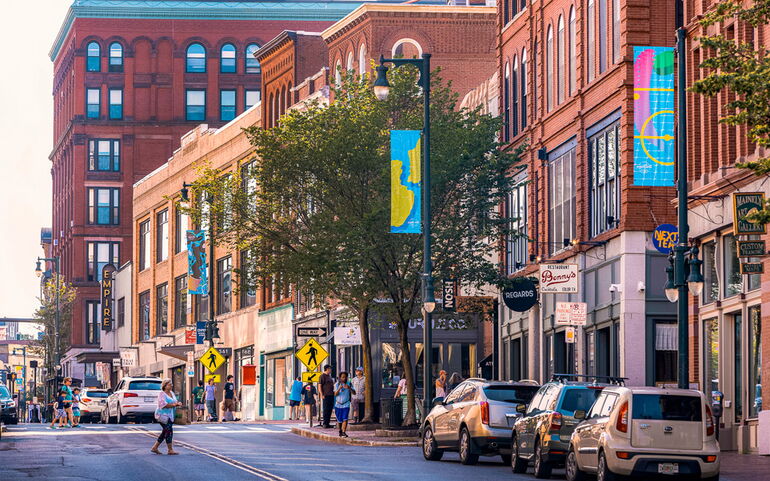Storefront vacancies in the Congress Street corridor reflect the economic costs of the city’s homeless problems, but some new businesses are also moving in.
Get Instant Access to This Article
Subscribe to Mainebiz and get immediate access to all of our subscriber-only content and much more.
- Critical Maine business news updated daily.
- Immediate access to all subscriber-only content on our website.
- Bi-weekly print or digital editions of our award-winning publication.
- Special bonus issues like the Mainebiz Book of Lists.
- Exclusive ticket prize draws for our in-person events.
[bypass-paywall-buynow-link link_text="Click here to purchase a paywall bypass link for this article"].
“Stay away from there.” Not the best sales pitch for downtown Portland, but that’s what a hotel bartender told a New Jersey couple vacationing in Maine when they mentioned plans to go out for dinner in the Monument Square area.
The pedestrian plaza, anchored by a monument to local Civil War soldiers, is at the foot of a three-block stretch of small retailers, cafes and restaurants along Congress Street — a longtime magnet for shoppers and tourists, but more recently also for people living on the streets.
Graffiti, overflowing trash cans, drug paraphernalia, boarded-up windows and barricaded entryways are common sights, with close to a dozen vacant storefronts laying bare the economic cost to a city that prides itself as a tourist mecca. Today, the small city has big city problems.
Jim Brady, a developer with plans to transform an early 20th-century bank building on Monument Square into a high-end hotel, can put a number to the costs. Before boarding up the vestibules as a safety precaution, Brady’s Fathom Cos. was paying around $2,000 a month on security services and another $3,000 to $5,000 to clean up debris, including human feces and discarded needles. He bought the building for more than $9 million.
“Since we boarded up the alcoves, the incident quantities have diminished significantly,” says Brady, who aims to open the hotel in 2027. The wooden barricades, spray-painted in red by the fire department, clash with the ornate Beaux Arts façade but blend in with the neighborhood’s smattering of patched-up doors and windows preyed on by vandals.
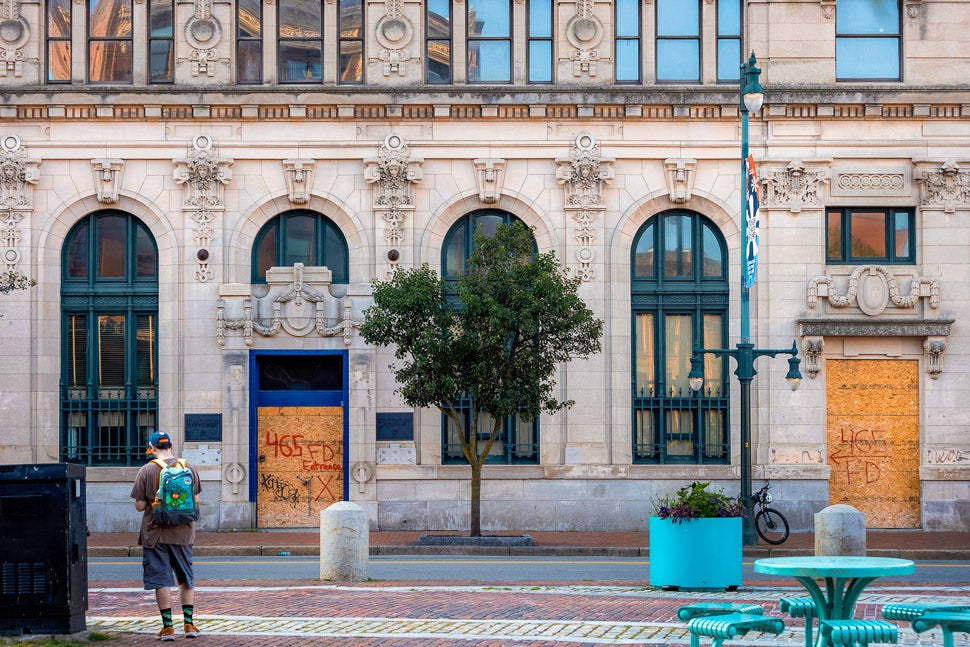
Brady says he’s angry at the city for “turning a blind eye” to homelessness and drug use. He nevertheless remains determined to breathe new life into a historic building in a troubled area, like he did on Exchange Street more than a decade ago when he turned a 1920s-era newspaper building into the Press Hotel.
The plan comes during a time of stress for Maine’s largest city, population 69,500. Celebrated as Bon Appetit magazine’s “Restaurant City of the Year” in 2018, Portland has in recent months gotten less favorable attention from the national press. In April, the New York Times reported about the scourge of drug addiction in Portland, with an extensive story and photos.
‘100 times worse’
As a 16-year Portland resident who manages several downtown residential and commercial properties, Rob Hastings has a front-row seat to what’s going on in town. He says that homelessness and drug use are “100 times worse since the pandemic,” and that he’d like to see more police on the streets.
“I feel safe myself, because I’m a guy who’s in relatively good shape,” he says, “but sometimes there are young ladies who work at places that close at 1 a.m. If there’s nobody around and somebody is in the parking lot, I fear for their safety.”
While not all crimes are reported, Portland Police Department data provided to Mainebiz show that there were 2,502 calls in a one-mile area along Congress Street between January and July, with 17 for criminal mischief (including property damage) and 42 for theft. The total is 1.5 times higher than 1,583 calls for the same period in 2024 and triple the tally in 2019.
A lot of those calls are from business owners like David Turin, a long-time restaurateur whose staff, customers and premises are frequent crime targets. “Our worst year with police was 2021, when I think we had 198 police calls in the summer,” he says in a downstairs office stacked with wine cartons and culinary awards.
In an April letter to the Portland City Council, Turin warned of “an existential crisis and a threat to my business,” including verbal abuse and physical threats against employees and customers, staff cars broken into on six occasions and the eatery’s front windows smashed twice in two years, resulting in hefty bills for a 58-employee business in a tight-margin industry.
Turin didn’t attend an evening meeting where his letter was read aloud, followed by a host of others voicing similar concerns; he was out volunteering to prepare meals for those in need.
“The idea of people being hungry, to me as a chef and a restaurateur, is abhorrent,” he says two months later. Frustrated with the fact that some of the people who need food can’t get into shelters because they don’t meet the drug-free requirement, Turin says he’d like to see more assistance with health care, housing and employment. He also suggests feeding them in a place that’s more discreet than Monument Square, where volunteers from Portland nonprofit Preble Street offer daily morning and afternoon meals along with social services.
“Humiliating the homeless people by feeding them in the most visible place in the city of Portland doesn’t make any sense to me,” says Turin.
Preble Street spokeswoman Danielle Smaha said the location of meal services isn’t the reason for homelessness on Congress Street and called for a “focus on long-term solutions.”
Turin, who owns another restaurant in South Portland on the other side of Casco Bay, says he has no plans to leave Monument Square.
“We have weathered this storm,” he says. “It’s not going to be our best year, but it’s not going to be our worst.”
Real estate’s rough ride
Safety concerns are taking their toll on the real estate market.
In the absence of an authoritative database on commercial properties, on-the-ground observations on the stretch of Congress Street between Monument Square and the Portland Museum of Art show close to a dozen empty storefronts.
While some windows include “For lease” signs with broker contacts, others have warnings — including a “No trespassing” sign on which someone scribbled “MAKE ME.”
Some have sat vacant for longer, like the Public Market House that has gone from two floors of food vendors before the pandemic to a single ground-floor tenant, or a large corner space across from the art museum that’s been unoccupied for decades.
The situation poses challenges for local agencies like Portland’s Dunham Group, which has seven listings on Congress Street that have been vacant between four months and two years. One is a former computer repair shop listed for lease at $18 per square foot and touted in the property brochure as move-in-ready in a “central downtown location.”
While that used to be a selling point, broker Tom Moulton says that’s now debatable: “We have lowered the prices up to 25% in some cases but that has not helped as demand is soft.”
On a walking tour of the neighborhood, Moulton says the area was once known for outdoor concerts and champagne-filled holiday festivities. Now he grumbles at the litter he sees along the way. “It is pretty unsettling to see the decline,” he says.
Another local broker, Peter Harrington of Malone Commercial Brokers, says, “I don’t think there’s a total perception that Congress Street is dead or never going to come back. It’s just been beaten down a little bit.”
Harrington’s offerings include a former corner cannabis shop at 555 Congress St. listed at $20 per square foot for 1,900-plus square feet with high ceilings and an open mezzanine level. What dissuades some potential tenants, he says, is less the rental prices than the cost of readying the space to operate a business.
Another hole will open up in the Congress Street corridor when Renys, a midcoast-based discounter with stores around the state, moves out at year’s end. Renys blamed the location’s anemic sales, which it said have not rebounded since the pandemic. Boulos Co. has been tapped to find a new occupant for the 24,800-square foot space at 540 Congress St. It’s leasable for $9.50 per square foot or for sale at $4.295 million.
Portland Mayor Mark Dion says the city will spend “whatever resources are needed” to keep Renys in Portland, as his economic development chief crafts a strategy for finding the next tenant for the Congress Street space “as quickly as possible.”
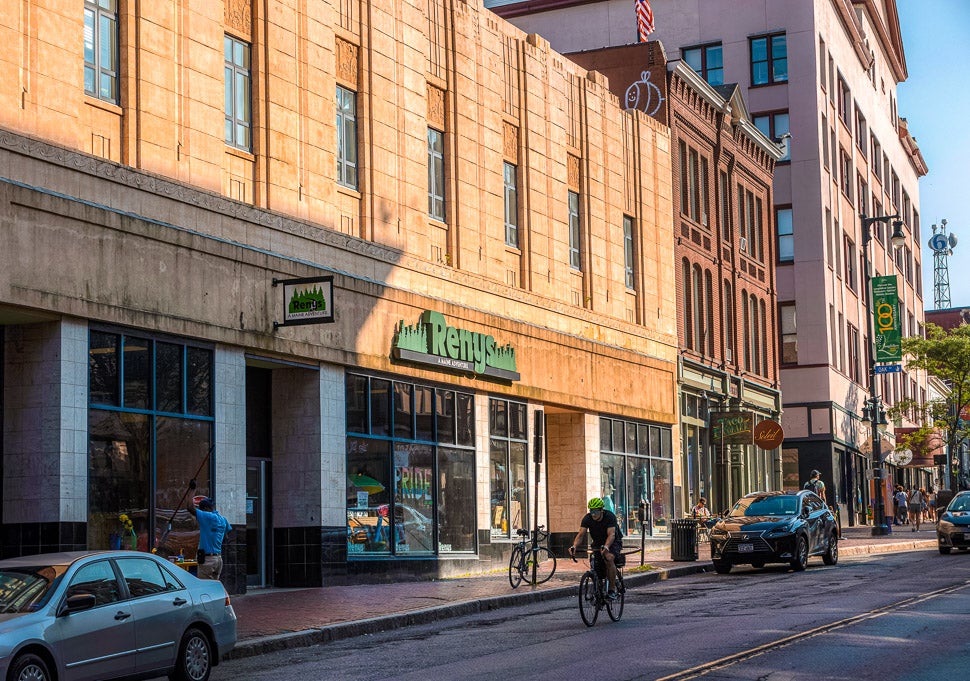
Chamber petition
In a petition signed by more than 1,000 Portland business owners, workers and residents as of mid-July, the Portland Regional Chamber of Commerce calls for “swift, coordinated action” by the City Council to make downtown safe and attractive again.
Quincy Hentzel, the group’s president and CEO, warns of repercussions if the city fails to act.
“In the short term, we expect vacancies to persist in the corridor and additional businesses to announce plans to close or relocate,” she says. “Ultimately, this can create a self-reinforcing ‘urban doom loop’ where disinvestment begets more disinvestment and even once profitable buildings become unmarketable.”
The city of Portland has already taken some steps to prettify the area, including a proposed commercial vacancy ordinance to encourage property owners to fill empty spaces with art installations or face fines of up to $7,500.
Greg Watson, the city’s economic development chief, says that while the measure is not meant to be punitive, it offers a “simple solution” to storefronts covered in brown paper displaying “obvious signs of disinvestment.”
The ordinance, set to be discussed by the City Council next month and voted on in September, is coming up against resistance from critics in the real estate world.
“It will force landlords to take the first deal that comes along versus waiting for the right tenant,” warns Moulton, of the Dunham Group. “It will ultimately hurt values as putting government controls on the free market always fails. It sends a terrible message to investors looking to move money to Portland.”
The city’s mayor, a former county sheriff elected on a tough-on-crime platform in November 2023, says during an interview in his office that police are “committed to provide the services they can and arrest people for notorious conduct.” The city is looking for ways to boost the police presence, including a planned community outpost on Congress Street — coincidentally in a building the chamber moved out of in 2023 which according to Hentzel was partly due to safety concerns. Police spokesman Brad Nadeau says that there are more patrols in the area.
Nonprofits stepping up
Complementing the city’s efforts is a new cadre of six cleanup “ambassadors” employed by Portland Downtown, a nonprofit underwritten by property owners. In the first six days of patrolling the so-called Downtown Improvement District in early July, they cleaned 87 trash cans and removed graffiti from 31 — recording 418 tasks in a dashboard that Executive Director Cary Tyson shared with Mainebiz.
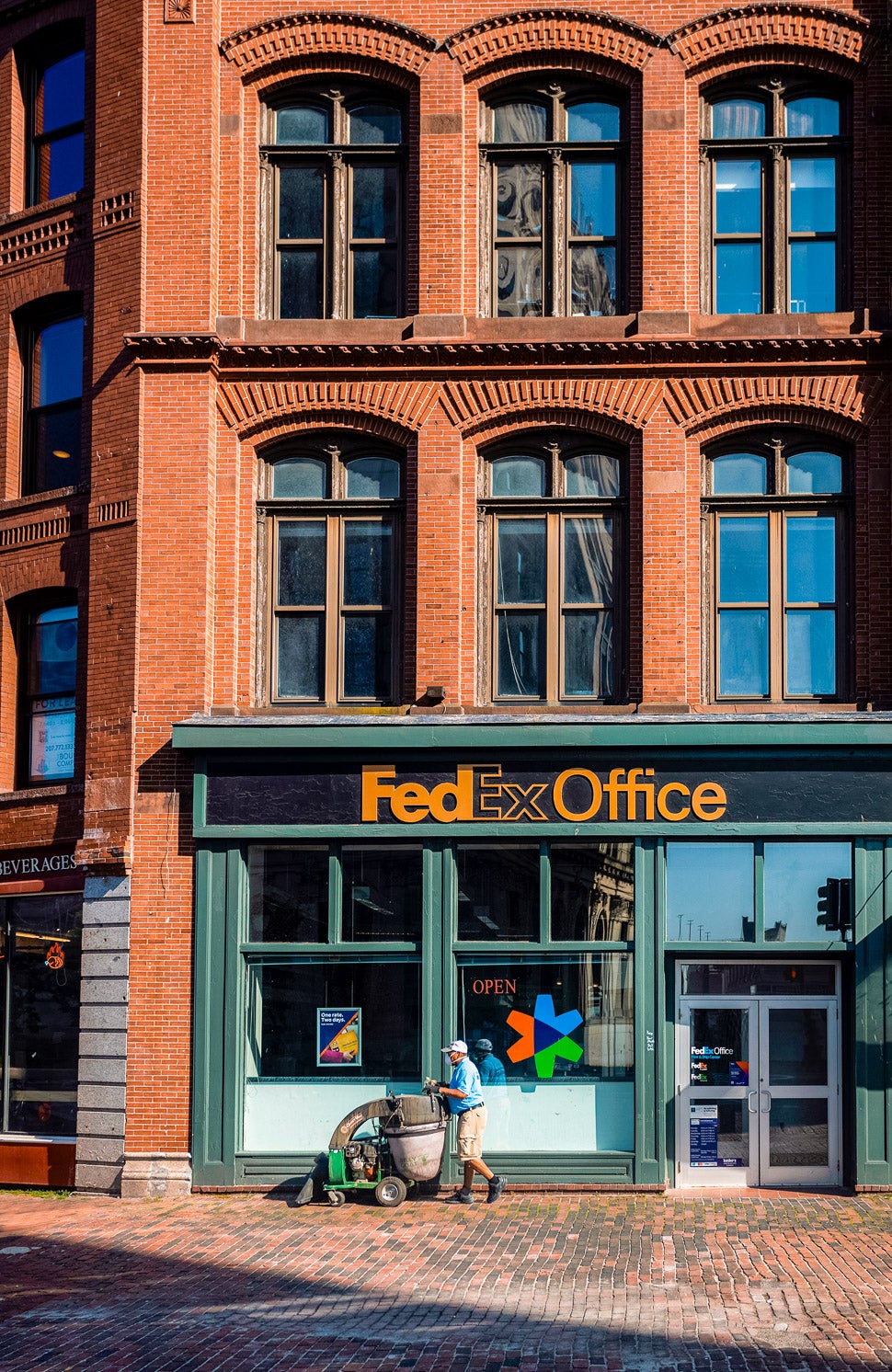
The program has funding for one year but expects to continue, perhaps expanding to include coverage from 6 a.m. until midnight or later, Tyson says. While there’s no “silver bullet” that will fix all of the city’s problems, “we’re putting our money where our mouth is and hiring these folks to get out there and do the good work that needs to be done,” he says as his staff settles into its spacious new office that will include a public restroom and private area for nursing moms.
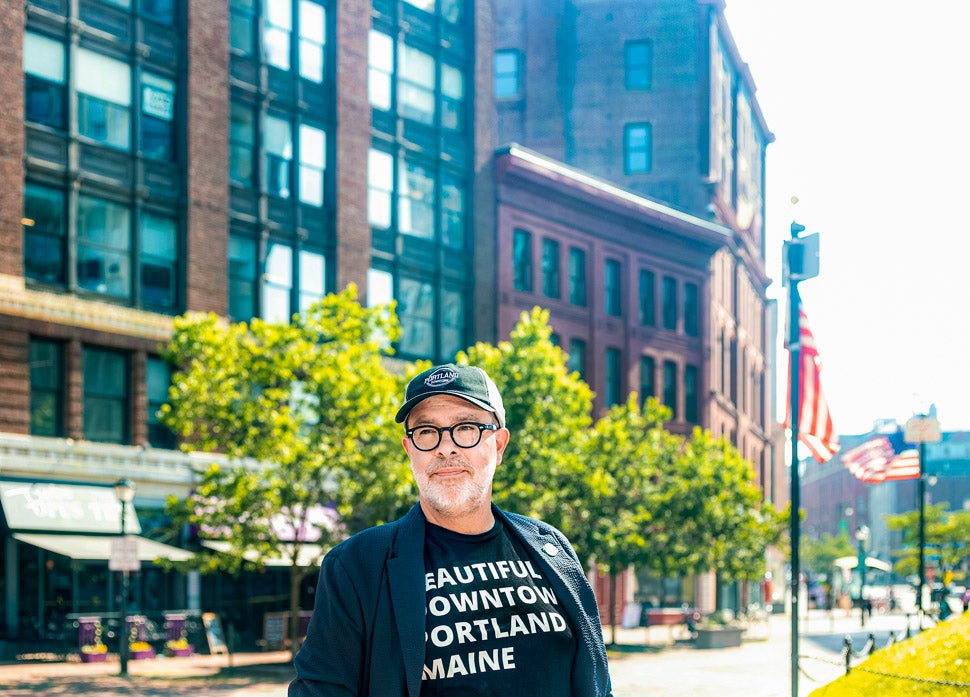
The organization has also teamed up with local nonprofit Mechanics’ Hall to start an Arts District Solutions Group to tackle the downtown crisis. Like the city in its proposed ordinance, the group aims to turn empty storefronts into temporary art galleries – and aims to raise $15,000 to ensure the artists are paid.
“This isn’t a call for blame, it’s a call for bold and coordinated action rooted in compassion, in public health and a shared vision for Portland’s future,” says Annie Leahy, executive director of Mechanics’ Hall, housed in an eponymous historic building on Congress Street. “I think there’s time to get it right, but we need leadership, we need coordination and we need a clear plan.”
Neighborhood’s new blood
Even as some downtown restaurants have gone out of business, partly as casualties of the pandemic, new ones are popping up. They include Benny’s, an Italian eatery inspired by owner Josh Sobel’s Philadelphia roots.
While he picked Congress Street for its high foot traffic across the street from Renys, Sobel — who also owns a sandwich shop on Washington Avenue called Ramona’s — says he’s not looking forward to having a vacant space when the downtown store closes.
“I wish there was something we could do, but we’re a new business and our margins are really thin,” he says. At some point, he’d like to get involved in charitable causes to help the homeless.
A few blocks away on Monument Square, James Shaffer is getting ready to open Bub’s Home Kitchen on the second story of the Public Market. The Public Market’s food hall was, before the pandemic, a bustling lunch spot, but it too has fewer tenants. Targeting an early August debut, Bub’s will serve pre-made take-home comfort foods, from chicken soup to baked rigatoni with tomato-rich marinara sauce.
Shaffer, who moved to Maine in 2019, previously ran a restaurant in Baltimore with his father. Now he’s signed a four-year lease to get a foothold in the Public Market. The rest of the upper level is empty — offering space for his startup to grow as he aims to become a regional wholesaler. He’s counting on the return-to-office trend to drive business at lunchtime.
“It’s still a great downtown and I want to be part of its revitalization,” he says.
